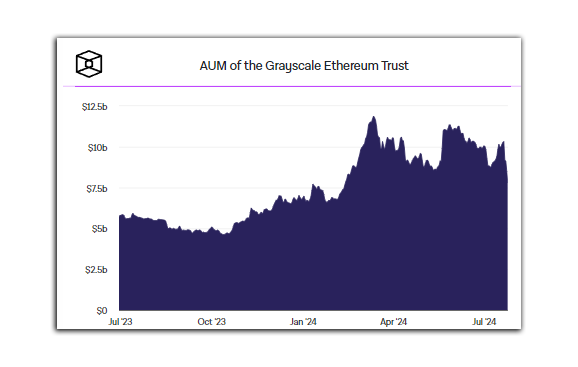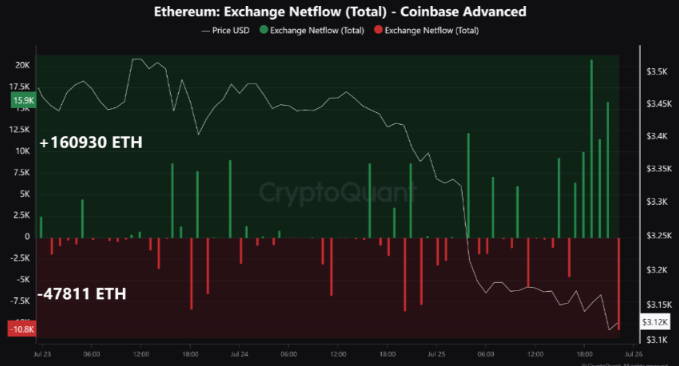The start of US spot Ethereum exchange traded funds has been quite strange. After the SEC approval, 8 out of 9 ETFs began trading on Tuesday. While one ETF saw heavy inflows, Grayscale’s converted fund, ETHE, experienced significant outflows. Let’s find out why Grayscale, a management firm, is facing such outflows.
The launch of ETH ETFs
Everyone knows that trading for US ETH ETFs started on July 23, and all 8 funds saw inflows of over $1 billion on the first day. However, Grayscale’s ETHE ticker, which has been trading on the OTC market, started experiencing heavy outflows from the first day. Grayscale’s Ethereum trust, which started as a private placement in 2017 and began publicly trading on the OTC markets in 2019, also launched an ETF under the ticker ETHE on NYSE on July 23. While the new ETFs saw substantial inflows, Grayscale’s existing ETF experienced $1.16 billion in outflows over the past three days.
Grayscale’s ETH Outflow
Experts believe that if this outflow continues at the current rate, the ETF could be depleted of all its Ethereum in less than a month. This could be due to ETHE’s high fee of 2.5%, whereas Grayscale’s new mini trust ETH ETF charges the lowest fee among the new ETFs at 0.15%.
Grayscale’s new ETF saw inflows of $119.1 million over the past three days. When combining the ETHE outflow data with the 7% drop in Ethereum’s price, the value of assets under Grayscale’s management fell from $10 billion to $7.5 billion in the same period.
Grayscale is currently experiencing a net daily outflow of around $385 million. If this trend continues, the ETHE could be emptied of all its Ethereum in less than a month. Another reason for this outflow could be that the older ETF ETHE no longer offers any discounts and has a high fee, as previously mentioned. Therefore, investors find it beneficial to exit the older ETF and invest in the new ones.

Analysis Inflow and Outflow
Along with Grayscale, there are 5 other ETF issuers using Coinbase crypto exchange as their custodian, while VanEck uses Gemini, and Fidelity manages its Ethereum itself. In the first two days, Coinbase saw an inflow of about 160,930 ETH. However, due to ETHE’s outflows, $811 million worth of funds exited Coinbase. The entry of 113,119 ETH into the Coinbase exchange created selling pressure in the market, leading to the observed drop in Ethereum’s price.

The Future Outlook
Looking at all these factors, it seems that the Ethereum ETF launch has become a classic case of “sell the news.” Investors are seeking their benefits, which is why Grayscale’s ETHE is facing heavy outflows. On the other hand, all the new ETH ETFs, including Grayscale’s mini trust, are seeing significant inflows. The current situation indicates that Grayscale will continue to experience heavy outflows from its older ETF, maintaining selling pressure on Ethereum. Only time will tell what happens next.
Credit: Source link






























